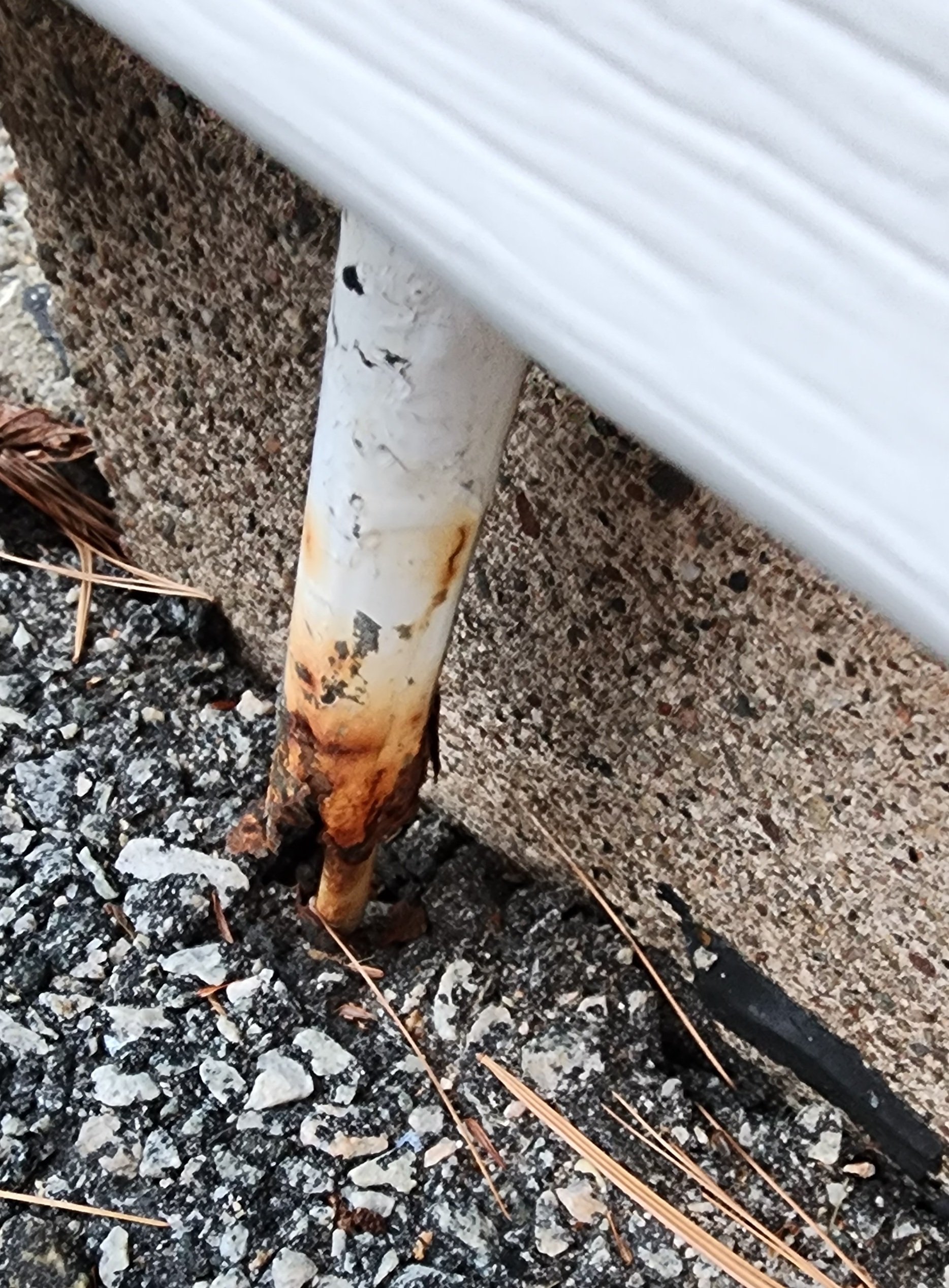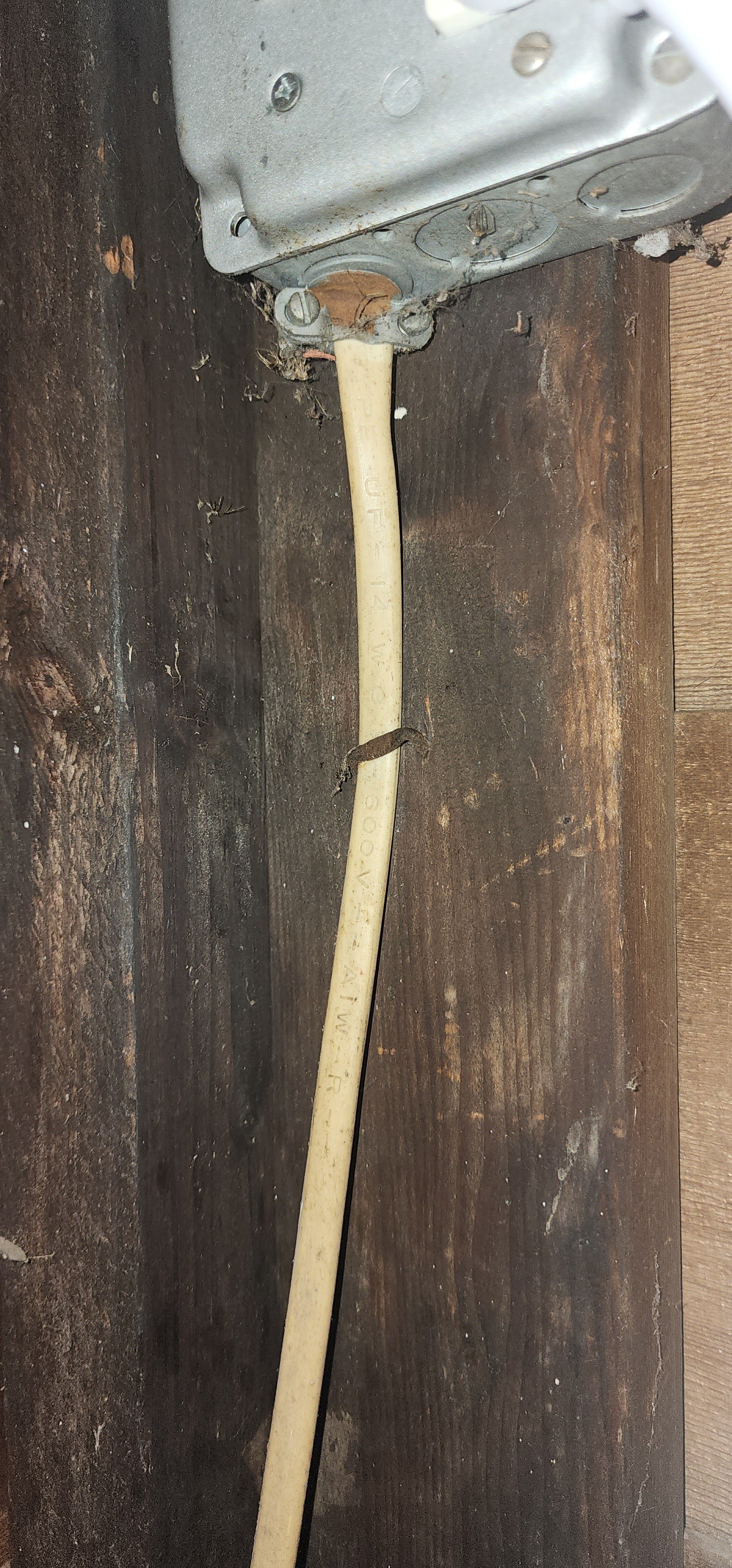
I purchased a house back in May and this was originally missed in the inspections. I have no idea how long it’s been like this, but I’ve been thinking of how I can fix this as soon as I noticed.
The detached garage gets its power from this buried romex wire that is exposed to the elements. It looks like it was originally protected by some sort of non-outdoor conduit at some point.
It’s now rusted through and exposed. The romex UF insulation still seems intact, but I’d obviously like to protect this more permanently.
The wire is powering a single outlet and light that is just above where this exits the ground and enters the garage.
I was thinking I could use some correct type of caulk (something for asphalt?) in combination with some correct conduit to make this safer. I can probably disconnect it from the outlet and pull it through to install conduit piping from the top. Or find something outdoor rated that is more U-shaped that can be bonded to the back wall to also protect this.
Anyone have any ideas? I’d very much like to avoid digging this up completely. If I were to server this wire in the process, there’s nothing I can do other than digging up the driveway.
Edit: thanks for all the comments everyone! I did go back to check and it is actually UF cable. I assumed romex but went back to check. After removing all the cobwebs and actually rubbing away the dust, I could make it out. I didn’t realize you could bury any cable right into the asphalt like that.

That steel conduit is just there for mechanical protection. The cable inside the pipe has its own insulation and you can assume its integrity is still good if its still working fine. I wouldn’t upgrade the protective device myself. If youd had no issues with the circuit then all id do is get a galvanised cable/pipe protector and cover the rusting pipe. (Im an electrician 🤙)
Cool thanks, I also didn’t realize it could be buried like that straight into asphalt so it all felt pretty weird. I’ll be replacing it to at least keep it safer than it is now. Even though there’s no reason why someone would be using one by the garage, I was just imagining someone accidentally hitting it with a weed wacker or something.
Is the cable actually directy buried and not in a pipe? It should be in conduit wherever its underground or exposed to potential damage like Your weed wacker. It looks like that pipe goes underground which is why i wasnt worried haha.
I had an issue the home inspectors missed. I called them, they sent someone out to verify, and they footed the bill for the repair. I would start there, and you may be in luck.
I figured we were well out of the window at this point, but you’re right in that it doesn’t hurt to ask.
I caught mine a few months later.
I would say this is already a lost cause. The proper thing to do would be to install a new PVC conduit and run a new circuit. Just because the wire jacket looks okay doesn’t mean it hasn’t been compromised.
Thank you. I’m thinking of getting a bit of work done on the driveway in the near future (probably Spring) so I’ll be asking them about this as well
I am no pro but I would get a piece of PVC pipe and cut a channel down it’s length and replace or cover the metal pipe one with it if you get large enough PVC pipe. I would take a couple ring clamps and tighten the fuck out of them to “close” the channel you created. My way would make it so you don’t have to disconnect the wire but still kill the breaker.
Yeah, I was originally thinking along similar lines of cutting a channel lengthwise down a pipe just enough to fit the cable through. Then closing the opening with caulk. But since I do have easy enough access to the top already, I think I’ll just slide it down though the top
So obviously this all isn’t very ideal but they actually made at least two mistakes here. That pipe is not rated for being outside and also Romex isn’t allowed to be used in wet areas such as underground. Only something like UF cable would be allowed to be ran buried like this.
There’s two things that you can do here, the right way and easy way. The right way would be to rip the whole wire out and run it properly. The easier way would be to kill the outlet at the breaker, disconnect the wire from the outlet and to carefully remove the pipe and replace with a PVC pipe that won’t rust. Get one from the electrical aisle because those won’t degrade in the sun.
Thanks, you pointing out the difference between romex and UF got me to go back out and specifically check the cable. It is in fact UF. I didn’t realize cable could be buried directly like this without some sort of protective conduit the whole way so didn’t think to check the level of cable it was.
I think I will do what you and a handful of others suggested, and disconnect the breaker then replace the pipe from the top. I think I will also get an AFCI breaker that was also mentioned just in case.
Assuming this is on its own circuit and you’ve got the space in your panel you could make whatever repairs to the conduit you think are practical and then swap the breaker for an arc fault circuit interruptor (AFCI). That should trip under any failure conditions you are likely to experience but it won’t stop the problem from getting worse. It’s not up to code either but I wouldn’t be too concerned about it under those conditions. That’s also assuming the wire run you can see during your repairs seems to be in decent shape.
There’s really no substitute for digging it up and replacing the whole damaged section of conduit but my suggestion would be a serviceable solution if that is untenable for some reason. It certainly doesn’t come without risks but neither does the situation you’re currently in.
Thank you for making me aware of AFCI breakers! I will definitely be picking one up just in case. I think I’ll go with the quick solution for now. I’m thinking of getting the driveway resealed and fixed up a bit in the near future (thinking maybe Spring) so I will ask about this with them as well
I have zero experience with this problem and I’m just spitballing but I’d consider. (Note that I’m rather stupid, don’t own a home, and uneducated about electrician stuff):
- Some kind of epoxy to just totally coat the outside. Slather it on and it hardens and I don’t have to think about it
- build a little enclosure around that bit so it’s living a bit more “inside”. probably impractical but a fun challenge
- wrap electrical tape, then pipe insulation. Tape over the pipe insulation then brush on something that cures into a waterproof seal
Also ask an electrician
As an electrician this is what id do if it was my house. Actually id just leave it unless i had kids haha

